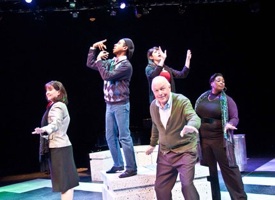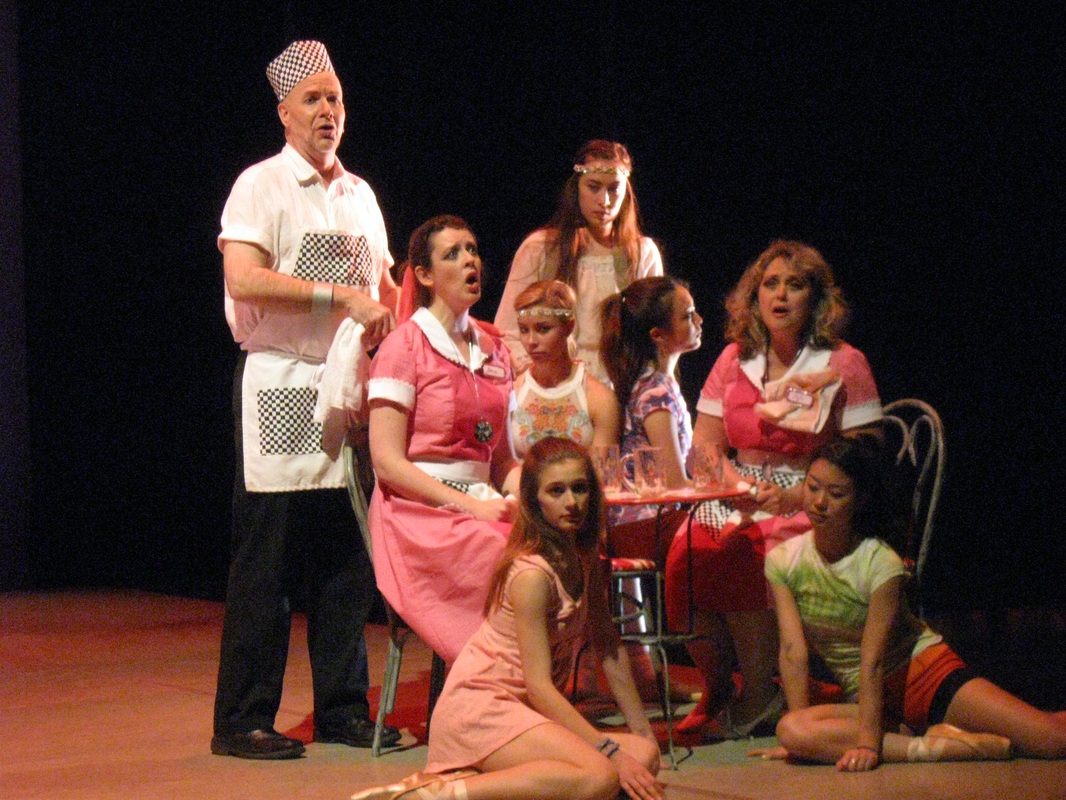|
Jacqueline Lawton: How long have you lived and worked as a playwright in DC? What brought you here? Why have you stayed?
Bari Biern: I moved to DC in 1975 after an acting job with an improvisation group in Cambridge MA fell through (they gave my slot to a former company member who had recovered from a nervous breakdown). I picked Washington because I had family here and it was accessible to New York. I’ve had a love/hate relationship with the nation’s capital over the years but, ultimately, I was won over by the close-knit theatre community and the ever-expanding range of opportunities available to work in the field I love. JL: Have you ever been a member of a DC area playwrights writing group? If so, did you find it useful? Would you recommend that other playwrights join them BB: Playwrights Forum founder Ernie Joselovitz has been my cherished mentor since I started writing. The Forum has presented excellent readings of four of my plays: Mapp & Lucia, Titus! The Musical!, The Real Thing and The Marriages. I’m also a proud virtual card-carrying member of the Naked Ladies Lunch and DC-Area Playwrights. I highly recommend belonging to a group of like-minded creative spirits. They offer comfort, empathy, good counsel, encouragement and, above all, community. JL: In DC, we have the Capital Fringe Festival, the Intersections Festival, the Source Theatre Festival the Kennedy Center's Page-to-Stage Festival, the Black Theater Festival, and the Hip Hop Theatre Festival. We also have the Mead Lab at Flashpoint Theater Lab Program. Have you participated in any of these? If so, can you speak about your experience? BB: I’ve had shows in the Capital Fringe Festival (Arlen & Berlin Occupy the Fringe!), the Intersections Festival (WAM2), the Source Theatre Festival (When You Care Enough with composer Roy Barber, nominee best musical), and the Kennedy Center’s Page-to-Stage Festival (The Real Thing & The Marriages, adapted from Henry James). What I loved most about these experiences was the opportunity to collaborate with some of the best actors and directors in town. Their talent and professional feedback were invaluable. I also appreciated the moderated post-show discussions with the audience. There’s no better way to learn what works and what doesn’t while your play is still in the developmental stage. JL: What kind of work do you do to pay the bills? How do you balance this work with your writing? BB: I’m a fulltime performer with the political satire troupe, the Capitol Steps. Happily, in addition to helping pay the bills, it’s a joyous job in every way. I also occasionally freelance as an off-camera announcer at C-SPAN and voice video game characters for Bethesda Softworks. JL: How many plays have you had produced in the DC area? Were any of these plays self-produced? If so, where and what did you learn from that experience? BB: I’ve had about a dozen shows produced in this area, including ten-minute plays, musicals, children’s shows and operas. JL: If you could be produced at any theatre in DC, which would it be and why? BB: It really depends on the project. I’d love to have my adaptations of Mapp and Lucia, The Marriages and The Real Thing produced by Washington Stage Guild. I’d love to collaborate on a children’s show with Adventure Theatre and Imagination Stage. I’d also like to have the opportunity to work with some of the newer edgier companies in the area, just to force me out of my comfort zone! JL: DC audiences are ... BB: ... sophisticated, adventurous and voracious. JL: DC actors, designers and directors are ... BB: ...the most talented in the business, bar none. JL: DC critics are ... BB: ... people who love theatre, whether you agree with them or not. I particularly appreciate the emergence of of websites like DC Metro Theatre Arts, DC Theatre Scene, Maryland Theatre Guide and the late allartsrevue4u, founded by the late Bob Anthony. These sites make a concerted effort to cover as many productions as possible, not just the larger venues. They help get the word out about smaller theatre companies, who rarely have much in their coffers for marketing. JL: How do you feel the DC theatre community has addressed the issues of race and gender parity ? How has this particular issue impacted you and your ability to get your work produced on the main stages? BB: One look at New York’s current Broadway season can send shivers down your spine--Porgy & Bess, Evita, Chicago, The Best Man, Who’s Afraid of Virginia Woolf--the youngest of these vehicles is over 30 years old and most of them are antiques! Theatre has always been a risky business (hey, Risky Business, the Musical!) but I like to think that, with more than 80 theatre companies of every shape, size and mission statement in the DC area, more diverse voices and, in particular, more local voices will be heard. JL: What advice do you have for an up and coming DC based playwright or a playwright who has just moved to D.C.? BB: Market yourself better than I do! JL: What's next for you as a playwright? Where can we keep up with your work? BB: Here's what I have coming up:
Check out my website, www.baribiern.com. Now that I’ve mentioned it, I’d better go update it!
0 Comments
Your comment will be posted after it is approved.
Leave a Reply. |
My BlogI'm a playwright, dramaturg, and teaching artist. It is here where you'll find my queries and musings on life, theater and the world. My posts advocate for diversity, inclusion, and equity in the American Theatre and updates on my own work. Please enjoy!
Categories
All
Archives
June 2020
Reading List
|



